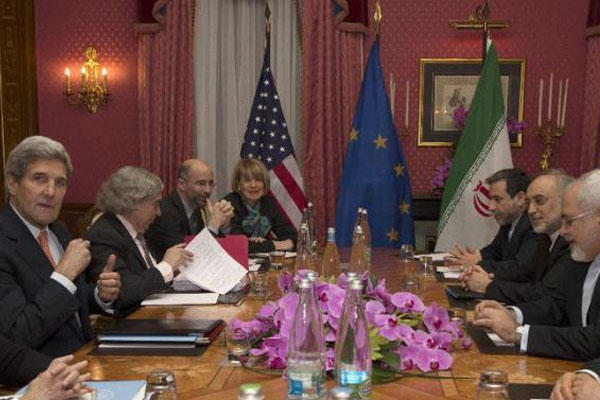Nearly 200 retired military leaders have signed a letter to the House and Senate leaders urging them to kill the Iran nuclear deal.
The letter calls the Joint Comprehensive Plan of Action unverifiable and argues it allows Iran too much notice of inspections, does not actually "cut off every pathway" to the country acquiring a nuclear weapons, but makes it more unstable and a greater threat to the U.S.
"In our professional opinion, far from being an alternative to war, the Joint Comprehensive Plan of Action makes it likely that the war the Iranian regime has waged against us since 1979 will continue, with far higher risks to our national security interests," concludes the letter, which was spearheaded by retired Navy Adm. Leon A. "Bud" Edney, a former Supreme Allied Commander of NATO.
The letter comes about two weeks after 36 retired admirals and generals released an open letter endorsing the deal that the U.S., Britain, France Germany, China and Russia reached with Iran.
The agreement includes measures that would prevent Iran from building a nuclear bomb for 10 to 15 years, with some requirements extending beyond that.
"If the deal is rejected by America, the Iranians could have a nuclear weapon within a year. The choice is that stark," wrote the deal's advocates, among them retired Marine Corps Gen. James "Hoss" Cartwright, a former vice chairman of the Joint Chiefs of Staff; retired Marine Gen. Joseph Hoar, a former commander of U.S. Central Command; and retired Air Force Chief of Staff Gen. Merrill "Tony" McPeak.
At the State Department on Thursday spokesman John Kirby rejected any contention that the 190 retired flag and general officers opposing the deal offered more credible arguments than those supporting it.
"It's not about the numbers. It is however about the facts and the merits of the deal," Kirby said.
Since the agreement was announced last month lawmakers from both parties have come out against it, including key Democrat's such as Sen. Chuck Schumer of New York.
Also signing onto the letter to reject the agreement is retired Army Lt. Gen. William G. "Jerry" Boykin. It was Boykin who, as a Deputy Undersecretary of Defense under President George W. Bush, stirred up controversy early by describing the war on terror in religious terms, claiming that Muslim countries hate the U.S. because it is a Judeo-Christian nation.
"And the enemy is a guy named Satan," Boykin said.
Other signatories include retired Air Force Gen. Richard Secord and retired Adm. John Poindexter, both of whom were linked to the Iran/Contra scandal of the Reagan administration.
A number of the signatories to both letters have affiliations with think tanks or other groups related to national security and Middle East policy.
Cartwright is with the Center for Strategic and International Studies and Hoar with the Middle East Policy Council, for example, both Washington, DC, think tanks that emphasize non-partisan analysis.
Edney, who was spurred to write the anti-deal letter after reading the one by agreement advocates, serves on the military committee of the Center for Security Policy, a non-profit organization with a neo-conservative reputation and a pro-Israel bias. Founder Frank Gaffney contends that the Muslim Brotherhood has a long range plan to destroy western civilization
Edney told The Washington Post he "looked at the letter they published, and thought it was very weak." So he put his own views in writing, sent it to other military retirees who, in turn, passed them along to others, according to the paper.
Four other retired flag and general officers on the center's military committee also signed the letter. Roughly an equal number signed who are also on the advisory board of the Jewish Institute for National Security Affairs, where Edney is on the advisory board.
-- Bryant Jordan can be reached at bryant.jordan@military.com






























